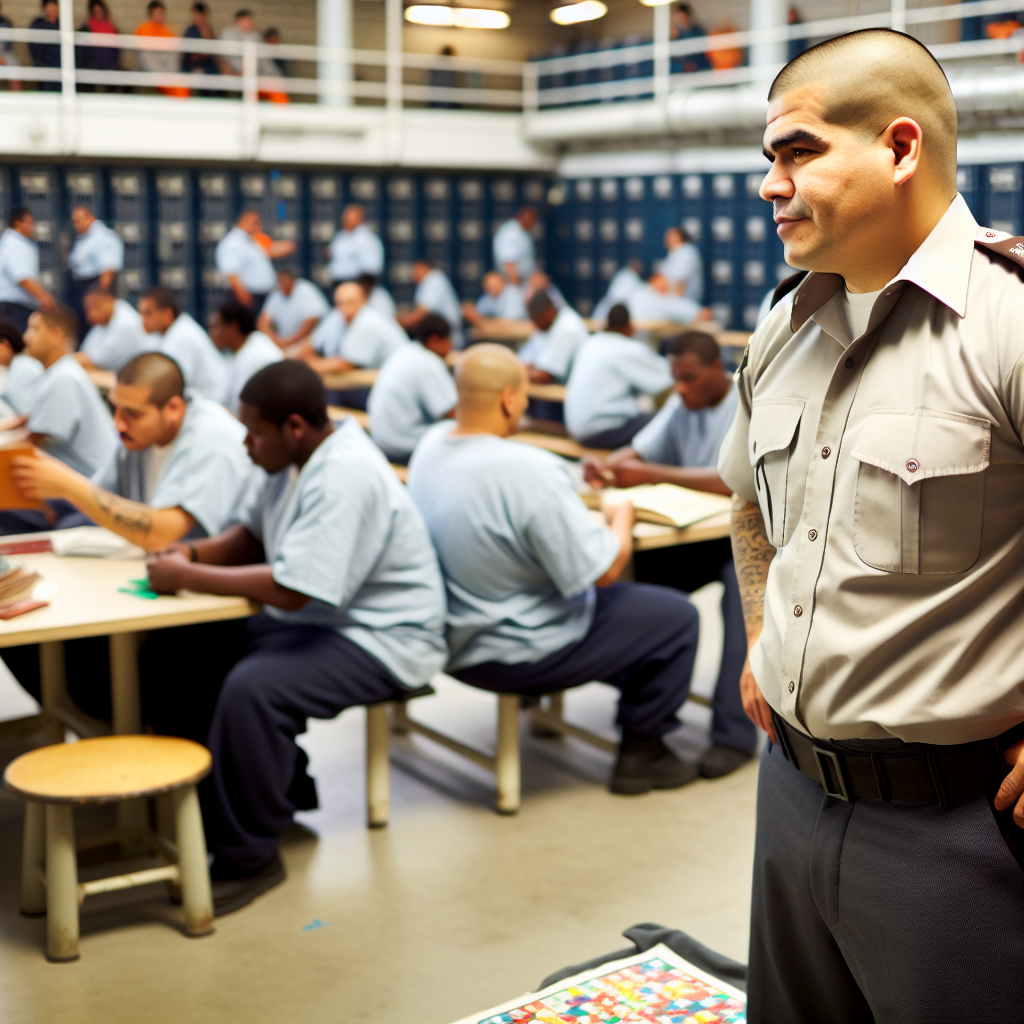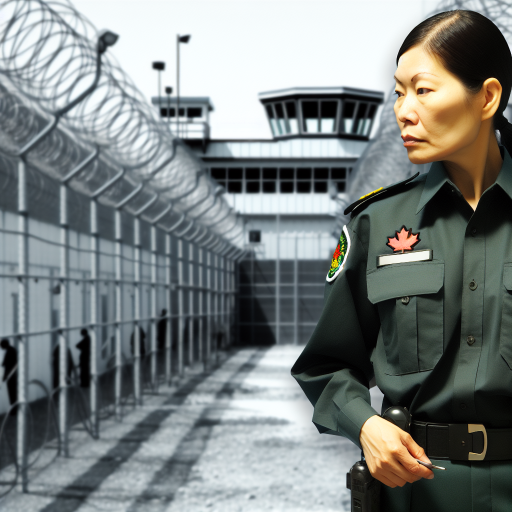Understanding the Role of a Correctional Officer in Canada
Core Responsibilities
Correctional officers maintain safety within correctional facilities.
They supervise inmate activities and ensure adherence to rules.
Additionally, they conduct regular inspections to prevent contraband.
They play a key role in managing inmate behavior and conflict resolution.
Required Skills and Qualities
Successful correctional officers possess strong communication skills.
They also need excellent problem-solving abilities.
Moreover, physical fitness is essential due to the demanding nature of the job.
Empathy and patience enable officers to work effectively with diverse populations.
Work Environment
Correctional officers work in various settings, including jails and prisons.
The environment can be stressful and requires constant vigilance.
Officers often work irregular hours, including nights and weekends.
They must be prepared to handle emergency situations at any time.
Training and Education
Becoming a correctional officer typically requires specific education.
Most provinces require at least a high school diploma or equivalent.
Completion of a correctional officer training program is often necessary.
On-the-job training provides hands-on experience crucial for the role.
Career Progression Opportunities
Correctional officers can advance in their careers through experience.
They may specialize in areas such as security management or rehabilitation.
Additionally, higher positions may include roles in administration or training.
Continuing education can further enhance career prospects.
Educational Requirements and Preferred Qualifications for Aspiring Correctional Officers
Basic Educational Requirements
To begin, aspiring correctional officers need a high school diploma or equivalent.
This is essential for meeting the initial hiring criteria.
Many institutions prefer candidates with post-secondary education.
Relevant courses include criminal justice, psychology, and sociology.
Post-Secondary Education Options
Enrolling in a college program enhances job prospects significantly.
Unlock Your Career Potential
Visualize a clear path to success with our tailored Career Consulting service. Personalized insights in just 1-3 days.
Get StartedDegrees in criminal justice or law enforcement are particularly valuable.
Moreover, specialized programs can offer practical experience and training.
Institutions like the University of Alberta and George Brown College provide such programs.
Preferred Qualifications
Employers often seek candidates with specific skills and attributes.
Strong communication and interpersonal skills are critical.
Additionally, candidates should display emotional resilience and stability.
Physical fitness is also a key consideration for many correctional facilities.
Certification and Training Programs
Completion of a correctional officer training program is typically required.
These programs cover essential skills, such as conflict resolution and emergency response.
In Canada, many provinces offer specific training courses for correctional officers.
For example, the Federal Correctional Service provides comprehensive training programs.
Experience and Background Checks
Relevant experience in law enforcement, security, or military service is advantageous.
Background checks ensure candidates are suitable for this critical role.
Employers review criminal records and personal references carefully.
Additionally, psychological evaluations may be part of the hiring process.
Continuous Learning and Development
Once employed, correctional officers must engage in ongoing training.
This includes updates on laws, regulations, and best practices.
Many facilities encourage attending workshops and conferences.
Furthermore, advanced training opportunities can lead to promotions.
Overview of the Correctional System in Canada
Structure of the Correctional System
The correctional system in Canada operates at two levels: federal and provincial.
Each level serves specific populations and fulfills distinct roles.
Federal institutions manage offenders serving sentences longer than two years.
In contrast, provincial institutions handle those sentenced to less than two years.
This distinction shapes the overall correctional experience for inmates.
Federal Institutions
Federal institutions fall under the jurisdiction of the Correctional Service Canada (CSC).
CSC is responsible for administering sentences and promoting rehabilitation.
These facilities provide various programs to support inmate reintegration.
Inmates gain access to education, vocational training, and substance abuse programs.
Moreover, federal institutions emphasize maintaining a safe environment for staff and inmates.
Provincial Institutions
Provincial institutions are managed by individual provinces and territories.
These facilities cater to a diverse population, including remand inmates.
Remand inmates await trial or sentencing and often have not been convicted.
Provincial systems focus on shorter-term sentences and immediate needs.
Many programs in provincial facilities prioritize mental health support.
Additionally, the emphasis on rehabilitation and reoffending prevention is critical.
Differences between Federal and Provincial Systems
Significant differences exist between federal and provincial institutions.
For example, federal prisons typically house more violent offenders.
Conversely, provincial facilities often have a higher turnover rate.
This means inmates stay for shorter periods in provincial institutions.
Another difference lies in program availability and access.
Federal institutions generally offer a wider range of rehabilitation programs.
On the other hand, provincial institutions focus on immediate inmate needs.
Importance of Understanding This Structure
Understanding the correctional system’s structure is crucial for aspiring correctional officers.
This knowledge helps them navigate their roles effectively.
Moreover, it enables better communication with inmates and colleagues.
Ultimately, this understanding enhances the overall safety and security of facilities.
Delve into the Subject: Stress Management for Canadian Correctional Officers
Key Skills and Attributes Needed for Success as a Correctional Officer
Communication Skills
Clear communication is vital in correctional facilities.
Correctional officers must convey information effectively.
Additionally, they must listen actively to inmates and colleagues.
Good communication fosters a safe environment.
Problem-Solving Abilities
Correctional officers face complex situations daily.
They need strong problem-solving skills to handle conflicts.
Effective officers assess problems quickly and develop solutions.
Moreover, they must be adaptable to changing circumstances.
Physical Fitness
Being physically fit is essential for correctional officers.
They may face physical confrontations and stressful situations.
Regular exercise helps maintain stamina and strength.
Furthermore, fitness promotes overall health and well-being.
Emotional Intelligence
Emotional intelligence plays a significant role in correctional work.
Officers must understand their emotions and those of others.
This skill aids in managing stressful interactions with inmates.
Additionally, it helps build rapport and trust.
Integrity and Ethics
Integrity is crucial in maintaining order within correctional facilities.
Officers must adhere to ethical standards at all times.
Moreover, they set an example for inmates and staff alike.
Upholding these values fosters respect and accountability.
Conflict Resolution Skills
Conflict resolution is a key responsibility of correctional officers.
They must de-escalate situations before they worsen.
Effective conflict resolution reduces violence in facilities.
Furthermore, it contributes to a more positive environment.
Attention to Detail
Attention to detail is essential for safety and security.
Correctional officers must observe behaviors and environments closely.
They should document incidents meticulously.
This attentiveness helps prevent issues before they escalate.
Learn More: Day in the Life of a Canadian Environmental Officer
The Application and Selection Process for Correctional Officer Positions
Overview of the Application Process
The application process for correctional officer positions starts online.
A candidate must visit the government job portal for relevant listings.
Indeed, applicants should create an account and submit their resumes.
Moreover, specific qualifications and experiences are essential.
Eligibility Criteria
To apply, candidates must meet basic eligibility criteria.
Applicants need to be Canadian citizens or permanent residents.
Additionally, they must be at least 18 years old.
Furthermore, a high school diploma or equivalent is required.
Relevant experience in law enforcement or human services is beneficial.
Assessment and Testing
Successful applicants face further assessments after their application.
Each candidate undergoes a written test focusing on aptitude.
Moreover, a physical fitness test evaluates their physical readiness.
Some regions may also require psychological assessments.
Interviews and Background Checks
Candidates passing the tests will be invited for interviews.
During this stage, candidates demonstrate their skills and motivations.
Furthermore, background checks play a significant role in the selection process.
These checks ensure candidates have a suitable history for the role.
Final Selection and Job Offer
After the interview, selected candidates receive job offers.
A formal letter outlines the terms and conditions of employment.
New hires undergo orientation and training before starting their duties.
This preparation equips them with necessary skills and knowledge.
You Might Also Like: Career Growth Opportunities in Border Services
Training Programs and Onboarding Process for New Correctional Officers
Overview of Training Programs
Training programs for correctional officers are essential for effective job performance.
These programs equip candidates with necessary skills and knowledge.
Typically, training involves both classroom instruction and practical exercises.
Instructors highlight topics such as conflict resolution and security protocols.
For instance, the Ontario Corrections Training Academy offers comprehensive training.
Students engage in simulations to prepare for real-world scenarios.
Prerequisites for Enrollment
Before starting training, candidates must meet specific prerequisites.
Most programs require a high school diploma or equivalent qualification.
Additionally, applicants must undergo background checks.
Moreover, they should exhibit strong communication and interpersonal skills.
The Onboarding Process
The onboarding process introduces new hires to their roles within the correctional system.
During onboarding, new officers receive orientation sessions to understand policies.
They also learn about safety procedures and workplace culture.
Additionally, mentors guide new officers through their early experiences.
Ongoing Training and Professional Development
Once on board, correctional officers participate in ongoing training opportunities.
These include refresher courses and specialized training programs.
Furthermore, professional development is essential for career advancement.
Officers often have access to workshops focusing on leadership and management skills.
This continuous education helps ensure they stay current in their field.
Support Resources for New Officers
New correctional officers can access several support resources during onboarding.
Many organizations offer counseling and peer support programs.
These resources promote mental well-being in a challenging work environment.
Additionally, officers can connect with experienced colleagues for advice.
Gain More Insights: Preparing for a Correctional Officer Interview in Canada

Career Advancement Opportunities and Specializations within Correctional Services
Introduction to Career Advancement
A career as a correctional officer offers numerous pathways for advancement.
You can pursue specialized roles that enhance your skills and career prospects.
With dedication and training, you can rise through the ranks in correctional services.
Common Pathways for Advancement
Correctional officers often start with entry-level positions.
These roles allow you to gain valuable experience in the field.
Many officers then transition into supervisory or managerial roles.
- Team Leader
- Training Officer
- Facility Manager
Seeking additional training can significantly bolster your advancement opportunities.
Specializations within Correctional Services
Correctional services offer various specializations for officers.
Choosing a specialization can lead to unique roles and responsibilities.
Behavioral Health Specialist
Officers can specialize in mental health support for inmates.
This role requires training in psychological assessments and counseling.
It is vital for addressing the needs of inmates with mental health issues.
Security and Safety Instructor
Some officers choose to become safety instructors.
This position involves training new employees in security protocols.
Your expertise helps ensure a safe environment within facilities.
Substance Abuse Counselor
Specializing as a substance abuse counselor is another option.
This role involves helping inmates overcome addiction issues.
It plays a crucial part in their rehabilitation and future reintegration.
Continuing Education and Training
Continual education is essential for career growth in correctional services.
Many officers pursue advanced degrees related to criminal justice.
Workshops and training sessions additionally enhance your qualifications.
- Conflict Resolution
- Crisis Intervention Techniques
- Legal and Ethical Standards
Participating in professional associations can also improve networking opportunities.
Networking Opportunities
Networking within the correctional services field can aid career growth.
Attending industry conferences exposes you to new contacts and ideas.
Engaging in mentorship programs provides valuable insights and guidance.
Building relationships with peers and leaders enriches your career journey.
Understanding the Challenges and Rewards of a Career in Corrections
Challenges Faced by Correctional Officers
Working as a correctional officer can be incredibly demanding.
The environment often exposes officers to high-stress situations.
Inmates may display unpredictable behavior, which can create tension.
Additionally, officers encounter challenging physical demands daily.
Shift work can disrupt personal life and sleep patterns.
Moreover, emotional resilience is crucial in managing frequent hostility.
Officers are often required to make critical decisions under pressure.
Lastly, the risk of physical confrontation is always present.
Rewards of Being a Correctional Officer
Despite the challenges, many find the role fulfilling.
Correctional officers play a vital role in public safety.
They contribute to rehabilitation programs that impact inmates’ lives.
This career offers opportunities for personal and professional growth.
Moreover, many enjoy the camaraderie among colleagues.
Officers often develop strong interpersonal skills through their work.
The job provides competitive salaries and comprehensive benefits.
Additionally, there are advancement opportunities within the system.
Skills Developed in Corrections
Working in corrections helps build valuable skills.
Communication skills are essential for effective interaction.
Conflict resolution abilities are crucial for maintaining order.
Decision-making skills improve through daily responsibilities.
Officers learn to assess situations quickly and accurately.
Leadership skills can also be honed in this environment.
Furthermore, physical fitness and mental resilience are emphasized.
Pathways to a Successful Career
A successful career in corrections often starts with education.
Many positions require a relevant diploma or degree.
Some may pursue specialized training programs in law enforcement.
Volunteering or internships can provide essential experience.
Networking with professionals in the field can offer valuable insights.
Additionally, ongoing training is vital for career advancement.
Officers should seek to develop both hard and soft skills.
Finally, maintaining a strong commitment to ethical standards is crucial.
Resources and Support Networks for Current and Aspiring Correctional Officers
Professional Associations
Professional associations provide valuable resources for correctional officers.
Organizations like the Correctional Service Canada offer guidance and support.
Networking opportunities arise through local and national conferences.
Additionally, these associations facilitate professional development through workshops.
Training Programs and Certifications
Various training programs enhance skills for correctional officers.
Institutions like the Ontario Police College provide specialized training.
Online courses also offer flexibility for continuous professional education.
Certifications improve job prospects and demonstrate commitment to the field.
Mental Health and Wellness Resources
Mental health support is crucial for correctional officers.
Organizations like the Public Safety Canada provide counseling services.
Workplace wellness programs also promote mental health awareness.
Peer support networks help officers connect and share experiences.
Community and Support Groups
Support groups offer a sense of belonging for current and aspiring officers.
Forums and online communities provide platforms for discussion and advice.
Local meetups foster connections among correctional professionals.
Additionally, mentorship programs can guide new officers in their careers.
Government and Policy Support
Government initiatives support correctional officer training and welfare.
Policies emphasize the importance of ongoing professional development.
Funding programs may help with education and training costs.
Additionally, advocacy groups work to improve working conditions.
Additional Resources
What can you DO with a Masters in Public Health? : r/publichealth
High-quality health systems in the Sustainable Development Goals …




